AIUK SOUTH AMERICA TEAM OCTOBER 2024 NEWSLETTER
Dear Friends
This month we bring you news from Colombia, Argentina, Venezuela, Brazil, Chile, Uruguay and Peru.
Highlights are:
- Regional: Amnesty has called on seven South American Presidents to strengthen action to reduce the risk of wildfires after recent record fires had a devasting impact on indigenous territories
- Colombia: We have an Urgent Action calling for those threatening and harassing Jani Silva to be brought to justice
- Argentina: We have a new Urgent Action urging Congress to insist on the passage of a law to improve pensions for older people.
- Venezuela: Amnesty has called for the extension of the mandate of the UN’s International Independent Fact-Finding Mission for Venezuela
- Brazil: Global Witness reports that 25 land and environmental defenders were killed in Brazil during 2023
- Chile: President Boric has promised to push for the repeal of a dictatorship-era law that rules out most investigations of crimes against humanity committed under General Pinochet.
- Peru: Former President Alberto Fujimori, who was convicted of human rights abuses and corruption, has died aged 86.
- Uruguay: Human Rights Watch report Uruguay’s shortcomings in meeting the support requirements of people with disability
REGIONAL
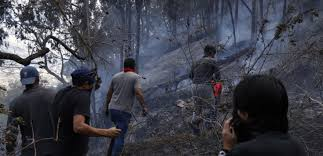 August and September 2024 saw record fires across South America, with several millions of hectares burning not only in rainforests of the Amazon basin, but also in diverse ecosystems stretching across entire countries. Amnesty has published an Open Letter addressed to the presidents of Argentina, Brazil, Bolivia, Colombia, Ecuador, Paraguay and Peru calling for governments to ramp up action to extinguish wildfires, strengthen efforts to abandon fossil fuels, protect territories of Indigenous Peoples and provide guarantees to environmental human rights defenders.
August and September 2024 saw record fires across South America, with several millions of hectares burning not only in rainforests of the Amazon basin, but also in diverse ecosystems stretching across entire countries. Amnesty has published an Open Letter addressed to the presidents of Argentina, Brazil, Bolivia, Colombia, Ecuador, Paraguay and Peru calling for governments to ramp up action to extinguish wildfires, strengthen efforts to abandon fossil fuels, protect territories of Indigenous Peoples and provide guarantees to environmental human rights defenders.
COLOMBIA
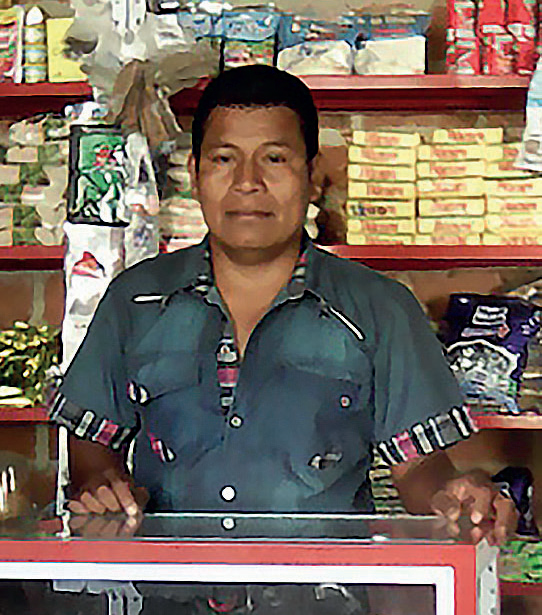
Amnesty has issued a new Urgent Action : On 10 September Jani Silva, a defender of land, territory and the environment in the Colombian Amazon (department of Putumayo), received a phone call threatening to “blow you up, car and all”. Jani and her association ADISPA have protection measures in place, provided by the government’s National Protection Unit (UNP). We call on the Colombian authorities to identify those responsible and to bring them to justice. Please take action. This is the letter we sent at our last meeting.
Global Witness reports that in 2023 Colombia was the most dangerous country in the world for land and environmental defenders ‘with a record 79 defenders killed last year compared to 60 in 2022, and 33 in 2021. With 461 killings from 2012 to 2023, Colombia has the highest number of reported environmental defender killings globally on record.’
The UN Special Rapporteur on extreme poverty and human rights said at the end of his visit to Colombia. “Unless eradicating poverty becomes a priority for all Colombians, no matter their income bracket, the vicious cycle of poverty and conflict will continue, and the country will never know peace… A lack of employment opportunities is making people in poverty an easy target for recruitment by non-state armed groups, and a lack of viable alternatives for coca farmers is leaving them with little choice but to continue growing illicit crops.”
Four UN Special Rapporteurs, including Amnesty International’s former Secretary General Irene Khan, have denounced the Colombian authorities for their failure to respond to the excessive use of force during the National Strike of 2021. ‘Three years after 2021 events, we find it unacceptable that the competent authorities have not progressed in effective investigations, in line with international standards, to uncover the facts and hold perpetrators accountable. This situation allows for impunity and puts victims and their families at increased risk of threats against their life and safety.’
The UK NGO ABColombia reports on the terms under which the Colombian government will negotiate with the AGC (Gaitanistas Self-Defence Force of Colombia), a criminal group. ‘The AGC’s current activities include drug trafficking, illegal mining, extortion, human trafficking and the control of legal and illegal economies in the places where they exercise exclusive control, which includes control of or participation in local public budgets.’ They have been going from strength to strength and now number 9,000 members. The NGO discusses the many challenges faced by the negotiators.
‘Total Peace’ talks with the ELN (National Liberation Army) guerrillas were suspended in response to an attack that killed two soldiers and injured 25. The guerrilla attack and subsequent suspension of talks come half a year after tensions between the two warring parties bogged down progress. Consequently, the government and guerrilla negotiators failed to come to an agreement on the extension of a ceasefire that expired in August. In Arauca, a province with significant ELN activity, the end of the ceasefire led to a surge in attacks on oil pipelines that were attributed to the ELN.
ARGENTINA
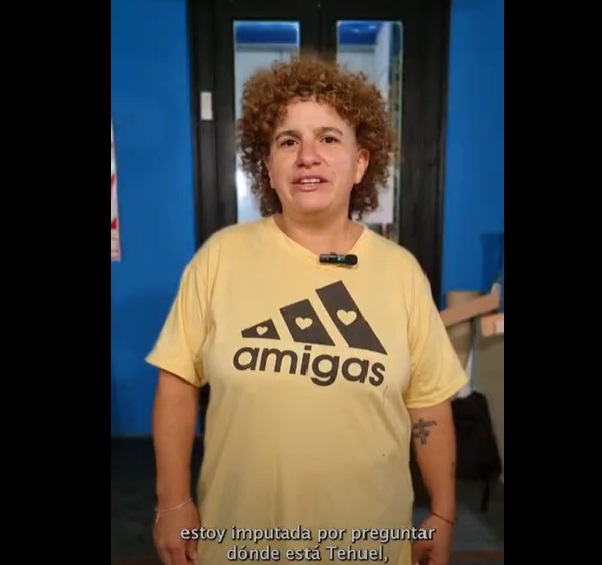
The trial of Pierina Nochetti is set for 30th of October; she is accused of painting graffiti and faces up to 4 years in prison. The Urgent Action calls for the charges to be dropped. There were widespread protests in Necochea over the disappearance of a young trans man, Tehuel de la Torre. Pierina had been prominent in this and other LGBTI campaigns, leading to penalisation by her local government employer, who then instigated the charges against her. Luis Alberto Ramos was recently sentenced to life imprisonment for the murder of Tehuel; another suspect awaits trial. See Pierina’s video of thanks.
President Javier Milei vetoed a bill that had been passed by Congress to improve pensions for older people. This was to adjust for the large loss of purchasing power they have suffered in recent months. There is an Urgent Action urging Congress to insist on approving the law as a measure towards the guarantee of a dignified standard of living for older people. Its a letter to the Chamber of Deputies; we have a separate link so you can email members of Congress individually.
The United Nations Committee on the Rights of the Child says it is “deeply concerned” by government cutbacks in Argentina to policies that help and protect children. The report flagged the “the high rates of sexual violence and abuse during childhood”. Amnesty International had previously alerted the Committee of its concern about the retraction in policies regarding the sexual and reproductive rights of children and adolescents. Every year, more than 40,000 girls and adolescents between the ages of 10 and 19 become mothers in Argentina. Of these, more than a thousand are under 15 years old.
VENEZUELA
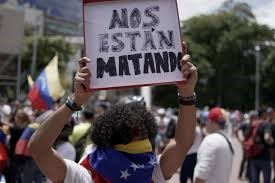 Amnesty International has demanded for the UN Committee for Human Rights to respond to the conclusions of the UN’s International Independent Fact-Finding Mission for Venezuela and to extend its mandate. The last report from the Mission details a critical human rights crisis and a new low in the deterioration of the rule of law after the recent presidential elections. Ana Piquer, who leads Amnesty’s work on the Americas, noted the bravery of the Venezuelan people who keep resisting the government’s repression, in contrast to the brutality of the Venezuelan regime.
Amnesty International has demanded for the UN Committee for Human Rights to respond to the conclusions of the UN’s International Independent Fact-Finding Mission for Venezuela and to extend its mandate. The last report from the Mission details a critical human rights crisis and a new low in the deterioration of the rule of law after the recent presidential elections. Ana Piquer, who leads Amnesty’s work on the Americas, noted the bravery of the Venezuelan people who keep resisting the government’s repression, in contrast to the brutality of the Venezuelan regime.
Meanwhile, protests continue in the Venezuelan capital of Caracas, with opposition figures continuing to state that the opposition candidate, Edmundo Gonzalez, was the rightful winner of the Presidential election. This is matched by mass rallies in capitals around the world, including in Madrid, where around 70,000 Venezuelans currently live, as well as in South American capitals.
Venezuelan opposition candidate Edmundo Gonzalez has claimed that he was “forced” to recognise President Nicolas Maduro as the winner of the election before being allowed to seek asylum in Spain. In a video message, González said Maduro’s aides had coerced him into signing a letter while he was hiding in the Spanish embassy in Venezuela’s capital Caracas earlier this month, noting that he had to endure tense hours of coercion, blackmail, and pressure. The UK Foreign Secretary David Lammy issued a statement in response to Gonzalez leaving the country, noting its concern at “serious irregularities in the declared results” and at “the unacceptability of the ongoing repression in Venezuela”.
The Venezuelan security forces had also surrounded the Argentine embassy in Caracas earlier this month, which was sheltering six Venezuelan political figures opposed to Maduro. The latest actions by the Venezuelan government come after the Argentine foreign ministry said it would ask the International Criminal Court to issue arrest warrants for Mr Maduro and other senior officials. Venezuela’s actions also drew condemnation from the governments of Brazil, Chile, Paraguay, and Uruguay.
BRAZIL
 Three anti-torture NGOs conclude that Brazil’s National Preventive Mechanism (NPM) marks ‘a significant advance in preventing and documenting torture and ill-treatment. ‘However, insufficient human resources and the failure to establish local preventive mechanisms nationwide, as required by law, pose major challenges.’ Unresolved issues include overcrowding and degrading conditions in prisons, police conduct during investigations, military jurisdiction on human rights offences and child torture in detention and lethal violence against children outside detention.
Three anti-torture NGOs conclude that Brazil’s National Preventive Mechanism (NPM) marks ‘a significant advance in preventing and documenting torture and ill-treatment. ‘However, insufficient human resources and the failure to establish local preventive mechanisms nationwide, as required by law, pose major challenges.’ Unresolved issues include overcrowding and degrading conditions in prisons, police conduct during investigations, military jurisdiction on human rights offences and child torture in detention and lethal violence against children outside detention.
Global Witness’s finds that 25 land and environmental defenders were killed in Brazil during 2023, the second largest number in the world.
Amazon Watch reports that anti-Indigenous groups have gained control of Brazil’s Congress and are pushing through regressive legislation and constitutional changes that threaten any hope for the demarcation of Indigenous territories. ‘This recent assault on Indigenous rights in Brazil is also an attack on the Amazon, and it will directly fuel the devastating fires already ravaging the region, threatening the rainforest, global climate stability and our collective wellbeing. It is a direct attack on our shared future for the sake of short-term profits for agribusiness and extractive industries.’
In the Guardian, Tom Phillips describes how Brazil’s Amazonian ‘Paradise’ is on fire: ‘The forest is burning. Animals are burning. Everything’s burning’. Water levels along the Madeira basin are at a 60-year low, smoke fills the air and passenger boats can’t reach their destination. ‘This year’s drought – which authorities have called the most intense and widespread in Brazil’s history – has brought misery to those who live along the Madeira… Indigenous communities have been hit particularly hard, with dozens of waterways drying up and dry vegetation supercharging wildfires that are ripping through their ancestral homes.’
CHILE

President Gabriel Boric has promised to push for the repeal of a dictatorship-era amnesty law that rules out most investigations of crimes against humanity committed under General Pinochet. He wants those accused of human rights abuses to stand trial in local courts. On September 11, Boric attended a ceremony marking the 51st anniversary of the coup which ushered in Pinochet’s dictatorship, during which thousands of people were murdered, tortured and disappeared. The government also announced that former torture centres would become sites of memory.
URUGUAY
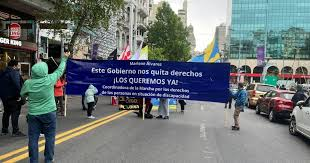 Human Rights Watch has released a report, “I, Too, Wish to Enjoy the Summer”: Gaps in Support Systems for People with Disabilities in Uruguay, which documents Uruguay’s shortcomings in meeting the support requirements under its National Integrated Care System for everyone with a disability. According to the report, Uruguay is among the first countries in the Americas to include personal assistance as part of its national care system, but it has yet to provide adequate services to support the independent living of all people with disabilities, which affects their enjoyment of other human rights.
Human Rights Watch has released a report, “I, Too, Wish to Enjoy the Summer”: Gaps in Support Systems for People with Disabilities in Uruguay, which documents Uruguay’s shortcomings in meeting the support requirements under its National Integrated Care System for everyone with a disability. According to the report, Uruguay is among the first countries in the Americas to include personal assistance as part of its national care system, but it has yet to provide adequate services to support the independent living of all people with disabilities, which affects their enjoyment of other human rights.
PERU
Peru’s former President Alberto Fujimori, who was convicted of human rights abuses and corruption, has died aged 86. Fujimori governed Peru between 1990 and 2000 before being forced from office amid allegations of corruption. His war on guerrilla insurgents led to serious abuses, for which he was given a lengthy jail sentence. Last December, he was released from prison with a presidential pardon, a decision that was denounced by the Inter-American Commission on Human Rights as contrary to Peru’s international obligations.
All the best,
South America Team – Richard Crosfield (Colombia and Brazil), David Rogers (Argentina and Chile), James Baird (Venezuela) and Graham Minter (rest of South America). And please don’t forget that you can follow us on our Facebook page and Twitter.